The Backstage Drama of MY FAIR LADY (100 Years of Warner Brothers Blogathon)
It was one of the biggest, if not the biggest movie of 1964, but My Fair Lady was plagued with backstage drama
Before we begin, this post is a part of the 100 Years of Warner Brothers Blogathon hosted by The Metzinger Sisters at Silver Scenes Blog. Click through to read all of the posts over the weekend!
My Fair Lady is, by all means, a tentpole in Audrey Hepburn’s
career. She’d come out of the gate with Roman Holiday in 1953—winning an
Oscar in her first major English-language movie—then kept up with strong
performances in films like Sabrina, The Nun’s Story, and Breakfast at
Tiffany’s.
She’d done only one musical before this, 1957’s Funny
Face opposite Fred Astaire. Her singing hadn’t been dubbed, but by 1964,
the producers of My Fair Lady were adamant that Audrey wouldn’t be
singing as Eliza Doolittle, the cockney flowerseller who gets elocution lessons
from Henry Higgins.
They just didn’t alert her to this fact until filming had
already started and she’d already recorded her songs. In fact, they’d propped
her up and told her that she would be singing, and they’d no doubt her voice
would sound fantastic in the end. They gave her singing lessons and a vocal
coach… and all the while there was a clause in her contract that permitted them
to dub over her voice.
According to Donald Spoto’s biography of Audrey, Enchantment,
Warner Bros. engaged Marni Nixon as Audrey’s singing voice in May 1963 and by
the time filming had begun in August, she was re-recording the songs Audrey had
already sung.
Audrey was filming and lip-synching to the songs she’d sung already, and was still in the dark that her voice would ultimately be replaced by Marni Nixon (you’ll recognize her voice in The King and I, West Side Story, and she finally gets to show her face on screen as a nun in The Sound of Music).
It was an accident that she found out when she did, and
Audrey experienced real heartbreak knowing that her vocals wouldn’t be heard.
You can still hear her singing on ‘Wouldn’t It Be Loverly?’ and ‘Just You Wait’
and her voice does seem to be more suited for the cockney accent, but… it’s
just not at Julie’s or Marni’s level. And that’s not a bad thing! Audrey’s
still great in the role, giving her all to her performance of Eliza.
But although she had the star power and the name recognition,
her casting as Eliza was controversial in and of itself because of the magnetism
of the young British actress who’d originated the role on Broadway and in the
West End: Julie Andrews.
‘My Fair Lady’ debuted at the Mark Hellinger Theatre on
Broadway on March 15, 1956. It starred Julie Andrews as Eliza Doolittle and Rex
Harrison as Henry Higgins, and it was, in short, a smash. It won many Tonys,
had a run on the West End with its original leads, and played until September
1962.
Of course Hollywood wanted to adapt it, and Jack Warner at
Warner Bros. was the man to do it. He just wanted an actress with established star
power in the role of Eliza, not the woman who brought her to life on Broadway.
By October 1962, Audrey was attached to the role of Eliza
Doolittle, commanding a salary of $1 million. The public outrage was swift:
Julie Andrews was Eliza Doolittle, and Rex Harrison and Stanely Holloway
were both reprising their stage roles, why not her?
In 2022, ahead of receiving the American Film Institute’s
Lifetime Achievement Award, Julie Andrews gave an interview to Vanity Fair
where she discussed the furore surrounding My Fair Lady.
She shared, once again, how she’d never expected to be
offered the role but had hoped it might happen. “But suddenly there was
Disney in the wings. And that happened instead. I've been incredibly fortunate
then—and really all my life—at miraculous turns of good fortune across my
path.”
Despite what many considered a strong performance, the fact
that Audrey’s vocals were dubbed meant that she wasn’t a strong contender for the
awards that season.
But in a quirk of fate, not being available for My Fair
Lady left Julie Andrews open for the Disney classic Mary Poppins,
which garnered her the Oscar and the Golden Globe, among other prizes.
Audrey would go on to be snubbed during awards season in
1964: Julie Andrews won both the Golden Globe and the Academy Award for Mary
Poppins, and she managed to sneak in an epic comeback to the man who paved
the way for her victory on Globes night: “My thanks to a man who made a
wonderful movie and who made all this possible in the first place, Mr. Jack
Warner.”
The two ladies met on Oscar night in 1965, and Audrey
confided in her: “Julie, you should have done it, but I didn’t have the guts
to turn it down.”
In an interview decades later, Julie said that this moment
cemented their friendship.
Audrey was pragmatic about her awards chances, and wrote to My
Fair Lady’s director, George Cukor, after her ‘snub’: “I think I am the
only one who is not in the dark. Everybody seems to search for an explanation. It
seems to me it is all very simple—my performance was not up to snuff… Because
My Fair Lady meant so terribly much to me, I had sort of secretly
hoped for a nomination but never counted on the Oscar. Therefore, disappointed I
is, but not astounded like my chums seem to be. What does amaze me is the hullabaloo
which ensued and the constant pressure…to get me to come to California on the
big night.”
She would make it out to California, as you’ve previously read. And she presented Rex Harrison with his Oscar, standing by his side throughout his entire speech. He would take care to thank both of his leading ladies: Julie Andrews and Audrey Hepburn.
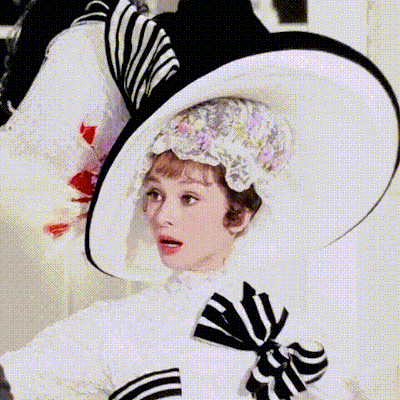
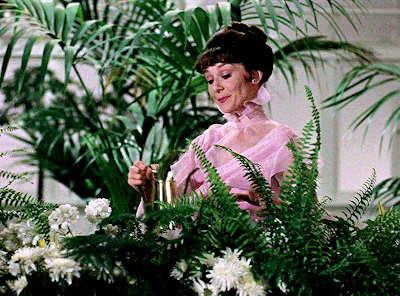
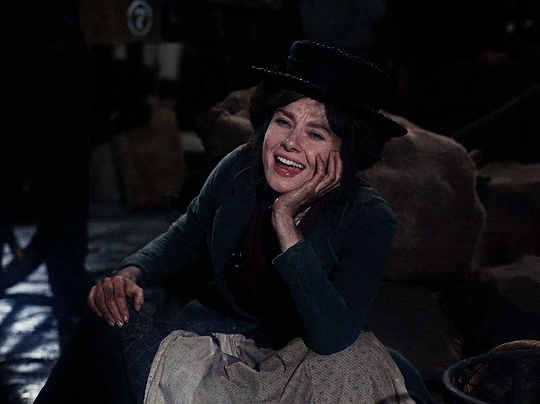
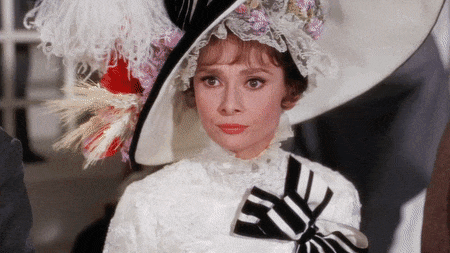
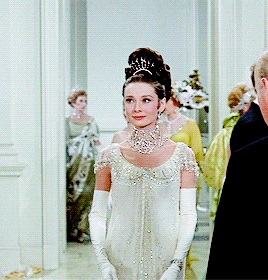
Awwww, poor Audrey AND poor Julie! I didn't know most of this, so I found this so interesting! I love Audrey Hepburn in this film, and can't quite imagine Julie Andrews in the role... plus, her not being Mary Poppins would have been a tragedy, so I guess I am happy with the way the film turned out. But I can see why people would have been upset, back in the day!
ReplyDeleteIt's interesting how things work out, although it probably seemed annoying at the time. I wish Audrey's voice had been used, but Marni definitely had an easier time hitting those high notes.
ReplyDelete